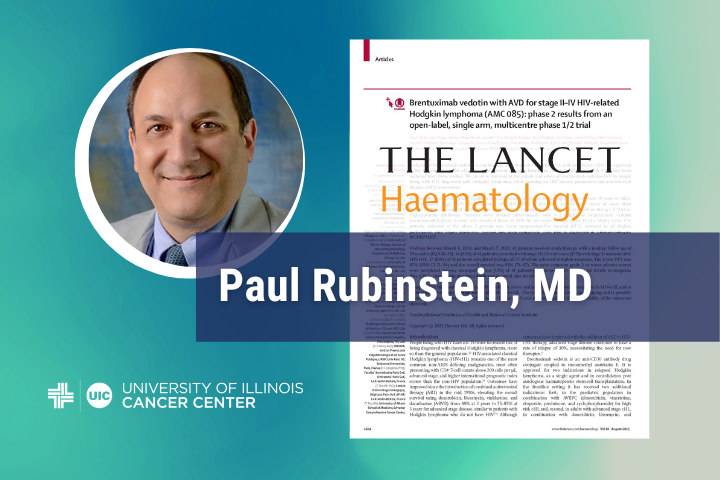
University of Illinois Cancer Center member Paul Rubinstein, MD, is the corresponding author on a potentially practice-changing manuscript published by Lancet Haematology. This is the first study to evaluate brentuximab vedotin as frontline therapy in combination with chemotherapy, AVD, for HIV-associated classical Hodgkin lymphoma (HIV-cHL).
HIV-cHL is the most common non-AIDS defining hematological cancer in people living with HIV. Brentuximab vedotin-AVD is approved for advanced stage cHL but people living with HIV have been excluded from those studies.
HIV-Associated Classical Hodgkin Lymphoma
In this study, “Brentuximab vedotin with AVD for stage II–IV HIV-related Hodgkin lymphoma (AMC 085): phase 2 results from an open-label, single arm, multicentre phase 1/2 trial,” researchers examined the activity and safety of brentuximab vedotin-AVD in people living with HIV diagnosed with Hodgkin lymphoma.
There were 41 patients enrolled, 90% completed therapy and 100% of those who completed therapy achieved a complete remission. The two-year progression-free survival was 87% and the two-year overall survival was 92%, superior to prior prospective studies in HIV-associated Hodgkin lymphoma. CD4+ T-cell counts increased during therapy despite the use of lympho-toxic chemotherapy. Adverse events were similar to brentuximab vedotin-AVD studies in the non-HIV population, as were outcomes.
Impact of Results
These results demonstrate that people living with HIV should always be included in prospective cancer studies.
This was an international study taking place in both France and the United States. It took 6 years to accrue patients, showing that international cooperation is needed to study diseases in smaller patient populations, such as people living with HIV, if larger studies are to be designed.
The study was funded by the National Institutes of Health and National Cancer Institute for the AIDS Malignancy Consortium in the United States and the Lymphoma Study Association (LYSA) in France.
